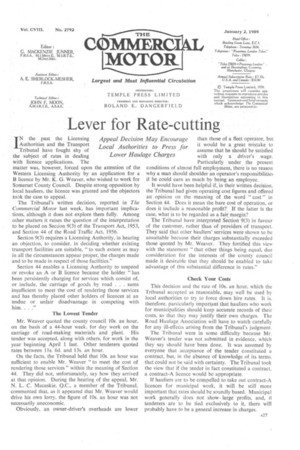Lever for Rate-cutting
Page 29

If you've noticed an error in this article please click here to report it so we can fix it.
IN the past the Licensing Authorities and the Transport Tribunal have fought shy of the subject of rates in dealing with licence applications. The matter was, however, forced upon the attention of the Western Licensing Authority by an application for a B licence by Mr. K. G. Weaver, who wished to work for Somerset County Council. Despite strong opposition by local hauliers, the licence was granted and the objectors took the case to appeal.
The Tribunal's written decision, reported in The Commercial Motor last week, has important implications, although it does not explore them fully. Among other matters it raises the question of the interpretation to be placed on Section 9(3) of the Transport Act, 1953, and Section 44 of the Road Traffic Act, 1956.
Section 9(3) requires a Licensing Authority, in hearing an objection, to consider, in deciding whether existing transport facilities are suitable, "to such extent as may in all the circumstances appear proper, the charges made and to be made in respect of those facilities."
Section 44 enables a Licensing Authority to suspend or revoke an A or B licence because the holder "has been persistently charging for services which consist of, or include, the carriage of goods by road . . . sums insufficient to meet the cost of rendering those services and has thereby placed other holders of licences at an undue or unfair disadvantage in competing with him. . ." The Lowest Tender Mr. Weaver quoted the county council 10s. an hour, on the basis of a 44-hour week, for day work on the carriage of road-making materials and plant. His tender was accepted, along with others, for work in the year beginning April 1 last. Other tenderers quoted rates between 1 I s. 6d. and 13s. an hour.
On the facts, the Tribunal held that 10s. an hour was sufficient to enable Mr. Weaver "to meet the cost of rendering those services" within the meaning Of Section 44. They did not, unfortunately, say how they arrived at that opinion. During the hearing of the appeal, Mr. N. L. C. Macaskie, Q.C., a member of the Tribunal, commented that, as it appeared that Mr. Weaver would drive his own lorry, the figure of 10s. an hour was not necessarily uneconomic.
Obviously, an owner-driver's overheads are lower Appeal Decision May Encourage than those of a fleet operator, but Local Authorities to Press for it would be a great mistake to assume that he should be satisfied with only a driver's wage. Particularly under . the present conditions of almost full employment, there is no reason why a man should shoulder an operator's responsibilities if he could earn as much by being an employee.
It would have been helpful if, in their written decision, the Tribunal had given operating cost figures and offered an opinion on the meaning of the word " cost " in Section 44. Does it mean the bare cost of operation, or does it include a reasonable profit? If the latter is the case, what is to be regarded as a fair margin?
The Tribunal have interpreted Section 9(3) in favour of the customer, rather than of providers of transport. They said that other hauliers' services were shown to bc unsuitable because their charges substantially exceeded those quoted by Mr. Weaver. They fortified this view with the statement "that other things being equal, due consideration for the interests of the county council made it desirable that they should be enabled to take advantage of this substantial difference in rates."
Check Your Costs This decision and the rate of 10s. an hour, which the Tribunal accepted as reasonable, may. well be used by local authorities to try to force down hire rates. It is, therefore, particularly important.that hauliers who work for municipalities should, keep accurate records of their costs, so that they may justify their own charges. The Road Haulage Association will have to watch carefully for any ill-effects arising from the Tribunal's judgment.
The Tribunal were in some difficulty because Mr. Weaver's tender was not submitted in evidence, which they say should have been done. It was assumed by everyone that acceptance of the tender constituted a contract, but, in the absence of knowledge of its terms. that could not be said with certainty. The Tribunal took the view that if the tender in fact constituted a contract. a contract-A licence would be appropriate.
If hauliers are to be compelled to take out contract-A licences for municipal work, it will be still more important that rates should be soundly based. Municipal work generally does not showlarge profits, and, it tenderers are to be tied exclusively to it, there will probably have to be a general increase in charges.




































































































